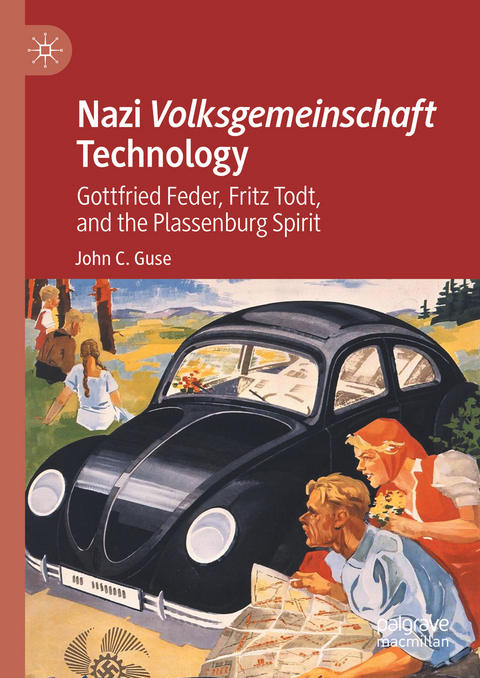
Nazi Volksgemeinschaft Technology
Springer International Publishing (Verlag)
978-3-031-32055-2 (ISBN)
John Guse studied at universities in Wisconsin, Nebraska, and at Bonn, Germany. He was a Director at the American School of Paris and inspecteur délégué for the French International Baccalaureat. His publications concern Fritz Todt, propaganda for Nazi technology, and a ‘forgotten’ internment camp in France.
1. Introduction.- 2. Gottfried Feder and Völkisch Technocracy.- 3. The Militant League of German Architects and Engineers.- 4. Feder to Todt: Limited Gleichschaltung of Engineers, 1933-1934.- 5. Gottfried Feder and Settlement: New Cities for The Volk.- 6. The Autobahn: Technology, Nature, Heimat, and Art.- 7. Fritz Todt and The Reordering of German Technology, 1935-1937.- 8. Educating Engineers: The Plassenburg School and Deutsche Technik.- 9. The Nazi "Voyages of Technology".- 10. Fritz Todt, War Minister, 1939-1943.- 11. Fritz Todt's "Speaker System".- 12. Albert Speer and the End of "German Technology".- 13. Technology for Pleasure And Death.- 14. Conclusion.
"In a concise yet thoroughly documented narrative, Guse demonstrates how Feder and Todt attempted to organize technology in the service of an almost utopian vision of a collective German identity that supposedly overrode class and other social distinctions ... . Guse shows how various visions of how to build technology in and for the Nazi Volksgemeinschaft experienced varying success, but in the end all these visions of constructing a Volksgemeinschaft technology were subordinated to the destruction unleashed by Nazi ideology." (Richard H. Beyler, H-Net Reviews, h-net.org, November 6, 2024)
"Historians ... have rarely engaged with the question of how German engineers interacted with Nazi ideology. John Guse's book confronts this question directly by analyzing the regime's two most prominent engineers, Gottfried Feder and Fritz Todt. ... By taking Fritz Todt's commitment to National Socialism seriously, Guse provides a much more critical and insightful analysis of the engineer than previous authors." (Mark Walker, H-Net Reviews, h-net.org_July2024)
"Guse summarizes decades of research ... and adds his own interpretations. His subtle distinctions between 'völkisch technocracy' and a 'spiritual revolution' are welcome. The author ably interweaves the changing meanings of ideology with analyses of the power politics of Nazi Germany. ... Guse's book offers significant insights regarding Todt and the politics of technology in Nazi Germany." (Thomas Zeller, European Review of History - Revue européenne d'histoire, July 23, 2024)
"... Insgesamt gibt das Buch von Guse einen guten Einblick in die Bedeutung der Technologie in der NS-Zeit mit spannenden Einzelbefunden und fügt sich in die einschlägigen Forschungsarbeiten zu diesem Themenfeld ein." (Andreas Haka, in: Technikgeschichte, Jg. 91, Heft 2, 2024)
"This book is a good survey of the transition from a völkisch technocracy à la Feder to totalitarian Deutsche Technik à la Todt, supported by archival documents from ten archives and research institutions, with a clear focus on a few key figures, the Reich School of Technology, and the 'technopolitical' journal Deutsche Technik." (Klaus Hentschel, Technology and Culture, Vol. 65 (3), July, 2024)
"... Insgesamt bietet Guse die bis heute beste und umfassendste Analyse der NS-Technikideologie. Er hat - bis auf wenige Ausnahmen - nicht nur den aktuellen Forschungsstand, sondern auch weitere umfängliche Quellenbestände ausgewertet. Guse demaskiert Fritz Todt als Mittäter Hitlers und liefert damit einen überaus wertvollen Beitrag zur politischen Bildung der Ingenieure heute - vor allem auch im Kontext der aktuellen politischen Entwicklungen." (Helmut Maier, in: H-Soz-Kult, hsozkult.de, 13. Juni, 2024)
"... Insgesamt präsentiert er ein Werk, das sich methodisch auf der Höhe der Zeit befindet, stringent einen äußerst interessanten und durchdachten Ansatz verfolgt und unser Verständnis über die Funktionslogik der NS-Herrschaft in einem marginalisierten Themenfeld bereichert." (Christian Packheiser, in: sehepunkte, sehepunkte.de, Jg. 24, Heft 6, 2024)
| Erscheinungsdatum | 28.10.2023 |
|---|---|
| Zusatzinfo | XXI, 309 p. 22 illus. |
| Verlagsort | Cham |
| Sprache | englisch |
| Maße | 148 x 210 mm |
| Gewicht | 560 g |
| Themenwelt | Geschichte ► Allgemeine Geschichte ► 1918 bis 1945 |
| Geisteswissenschaften ► Geschichte ► Regional- / Ländergeschichte | |
| Geschichte ► Teilgebiete der Geschichte ► Militärgeschichte | |
| Geschichte ► Teilgebiete der Geschichte ► Technikgeschichte | |
| Schlagworte | Albert Speer • deutsche Technik • Plassenburg School • volkisch • Volksgemeinschaft |
| ISBN-10 | 3-031-32055-7 / 3031320557 |
| ISBN-13 | 978-3-031-32055-2 / 9783031320552 |
| Zustand | Neuware |
| Haben Sie eine Frage zum Produkt? |
aus dem Bereich


